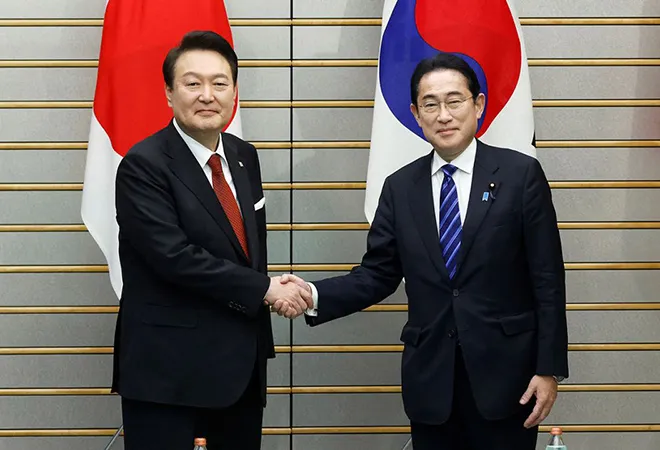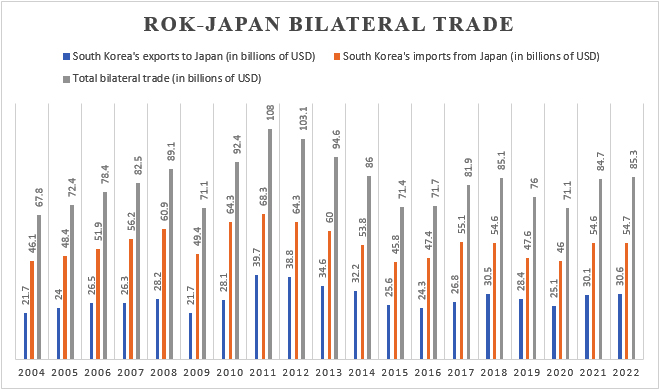
East Asian politics and history has remained turbulent over the past centuries. Despite sharing many similarities in culture, the countries have remained divided largely because of turbulent political ties. South Korea’s relationship with Japan is marred by the latter’s brutal colonisation history. Despite sharing significant economic ties, the relationship has always found itself stumbling upon the issue of comfort women and wartime labour issues. This has been a hindrance in achieving its full potential, especially amidst the looming North Korean nuclear threat and over-reliance on the Chinese economy and its misadventures in the Indo-Pacific. This piece sheds light on how their mutual strategies toward China and North Korea and the warming of their bilateral relationship have led to the
recent summit between South Korea and Japan.
High-level bilateral visits between Japan and ROK
| Timeline |
Number of visits by ROK’s President to Japan |
Number of visits by Japan's Prime Minister to ROK |
Number of visits by ROK’s Foreign Ministers Visit to Japan |
Number of visits by Japan's Foreign Minister to ROK |
| 2003-2008 |
5 |
6 |
7 |
4 |
| 2008-2013 |
3 |
5 |
5 |
5 |
| 2013-2018 |
0 |
0 |
4 |
3 |
| 2018-2023 |
1 |
0 |
1 |
0 |
Source- MOFA
The recent summit in March 2023 marks the first meeting between the two nations' leaders in 12 years and is focused on addressing the shared threat posed by North Korea and growing concerns over China. Post-summit, Japanese Prime Minister Fumio Kishida emphasised opening a new chapter in their bilateral relationship with frequent visits by leaders from both countries that are not bound by formalities. Kishida added that Japan and South Korea have sought to resume bilateral security talks against the backdrop of rising threats from North Korea and have
concluded the significance of a “Free and open Indo-Pacific” (FOIP).
Meanwhile, South Korean President Yoon Suk
Yeol expressed his willingness to fully restore the military intelligence-sharing agreement with Japan, which was terminated in 2019 due to an ongoing disagreement regarding forced labour. He added that sharing information regarding North Korea's nuclear missile launches and trajectories is necessary and that both countries should be capable of responding to them appropriately. Moreover, prior to the summit, Seoul and Tokyo resolved a protracted trade disagreement, with
Japan agreeing to remove export controls on advanced materials employed in the manufacturing of semiconductors and display panels to South Korea, while
Seoul agreed to withdraw its complaint concerning the limitations at the World Trade Organization (WTO). Thus, the meeting between Yoon and Kishida represents a significant milestone in the efforts to reconcile the long-standing issues and distrust that have plagued the relationship between these two key US allies in Asia.
Bilateral trade between ROK and Japan:
 Source https://unipass.customs.go.kr/ets/index_eng.do
Source https://unipass.customs.go.kr/ets/index_eng.do
Mutual strategic interests
The Biden administration has been actively pushing for reconciliation and has maintained a steady pace of senior-level trilateral meetings since South Korean President Yoon took charge in May 2022. However, according to the US State Department spokesperson,
the recent arrangements between Japan and South Korea were the result of bilateral discussions, rather than pressure from the United States (US). The recent reconciliation between Japan and South Korea has largely been driven by growing security concerns, including North Korea's blitzkrieg of missile tests, Beijing's increasingly aggressive military stance, and the rising tensions in the Taiwan Strait. Both countries have identified the Taiwan Strait and Indo-Pacific as critical areas for their security, further highlighting the importance of closer cooperation between them. While dealing separately with North Korea, South Korea has rigorously participated in military drills with the US. Similarly, Japan has hinted at their intentions through the adoption of aggressive policies such as the revised
National Security Strategy.
Recent dialogues have encompassed economic security and cooperation concerning vital technologies. In November 2022, an agreement was reached between Seoul and Tokyo to engage in the
exchange of real-time intelligence on Pyongyang’s missile launches. This strategic step is anticipated to enhance both nations’ ability to track potential threats originating from North Korea. While
South Korea's sensors tend to offer a superior view of when a missile is launched, Japan is often better equipped to monitor its landing location.
The recent reconciliation between Japan and South Korea has largely been driven by growing security concerns, including North Korea's blitzkrieg of missile tests, Beijing's increasingly aggressive military stance, and the rising tensions in the Taiwan Strait.
According to a Japanese Defense Ministry official, American authorities are urging South Korea and Japan to adopt a more assertive stance towards the threat of North Korea to enable the US to prioritise other matters, including China and Ukraine. The US aims to bring South Korea closer to the Quad, consisting of the US, Japan, Australia, and India.
Yoon stated that Seoul is currently considering cooperation through its involvement in the working groups of the Quad, which are focused on vaccine development and climate change. However, he did not mention any intention of pursuing membership in the Quad. The recent agreement on “wartime forced labour” is perceived as a noteworthy concession and has the potential to serve as a milestone in the progress of defence cooperation among the three countries. Subsequently, officials from the three nations
will convene in Washington this month to deliberate on military information-sharing specifics.
From overcoming disputes to warming ties
Following a significant breakthrough by South Korea in resolving protracted disputes, there has been a gradual improvement in relations. South Korea recently announced that it would provide
compensation to the forced labour victims during Japan's colonial rule (1910-1945). It will be done through a public foundation financed by private Korean companies instead of requesting Japanese firms. This action was lauded by Japan and Washington. Since assuming office, the leaders of the two nations have undertaken numerous diplomatic initiatives to enhance bilateral ties and intensify their joint partnership with Washington. In
September 2022, Yoon and Kishida held the first summit since 2019 on the sidelines of the United Nations General Assembly, where the two leaders agreed to enhance their bilateral relationship.
Glimpses of this rapprochement were visible in the 1 March 2023 speech by Yoon, commemorating South Korea's protest against Japan's colonial occupation. He said that Japan has
moved beyond its colonial aggressor mindset and has turned into a partner with similar universal values. The soured relationship was not only hindering US-led efforts to present a unified stance against the growing influence of China but also impeding the two American allies' attempts to establish high-tech supply chains that are protected from China's influence. Yoon indicated that cooperation between them on high-tech supply chains would make a significant contribution to economic security. Additionally, Yoon emphasised that these efforts would also entail the participation of Beijing. He
stated that strengthened relations between South Korea and Japan would not only contribute to economic security but would also aid in promoting stable economic relations with China.
Beijing swiftly criticised the decision and called for an end to “exclusive and closed groups” among individual nations, while expressing hope that the improvement in Japan-South Korea relations would promote regional peace, stability, and prosperity. It is
reported that China backs a trilateral summit with South Korea and Japan for deepening of ties.
The soured relationship was not only hindering US-led efforts to present a unified stance against the growing influence of China but also impeding the two American allies' attempts to establish high-tech supply chains that are protected from China's influence.
Nonetheless, even though closer ties with Japan have been forged, it has not been widely accepted by the Koreans. A
recent Gallup poll shows that 60 percent South Koreans oppose the labour compensation plan. Furthermore, some critics have accused Yoon of adopting a Cold War mindset vis-à-vis China, Russia, and North Korea, which may result in South Korea being embroiled in regional conflicts. Former chancellor of the Korean National Diplomatic Academy, Kim Joon-Hyung,
stated that, “Seoul is aligning and drawing itself to the Cold War,” which could present a more significant problem since South Korea may become entangled if a conflict arises in Taiwan. According to analysts, the Yoon administration is keen to convince the domestic audience that this matter is not limited to Japan but to a wider coalition of liberal democracies. China’s recent aggression and authoritative stances towards South Korea, repetitive threats to Taiwan, and the brutal suppression of the Hong Kong protests, among others, have undoubtedly set the stage for this cooperation. However, it is too early to say if the bilateral relationship will prosper as the colonial past will keep haunting both states, which might create a roadblock in this cooperation.
The views expressed above belong to the author(s). ORF research and analyses now available on Telegram! Click here to access our curated content — blogs, longforms and interviews.



 East Asian politics and history has remained turbulent over the past centuries. Despite sharing many similarities in culture, the countries have remained divided largely because of turbulent political ties. South Korea’s relationship with Japan is marred by the latter’s brutal colonisation history. Despite sharing significant economic ties, the relationship has always found itself stumbling upon the issue of comfort women and wartime labour issues. This has been a hindrance in achieving its full potential, especially amidst the looming North Korean nuclear threat and over-reliance on the Chinese economy and its misadventures in the Indo-Pacific. This piece sheds light on how their mutual strategies toward China and North Korea and the warming of their bilateral relationship have led to the
East Asian politics and history has remained turbulent over the past centuries. Despite sharing many similarities in culture, the countries have remained divided largely because of turbulent political ties. South Korea’s relationship with Japan is marred by the latter’s brutal colonisation history. Despite sharing significant economic ties, the relationship has always found itself stumbling upon the issue of comfort women and wartime labour issues. This has been a hindrance in achieving its full potential, especially amidst the looming North Korean nuclear threat and over-reliance on the Chinese economy and its misadventures in the Indo-Pacific. This piece sheds light on how their mutual strategies toward China and North Korea and the warming of their bilateral relationship have led to the 
 PREV
PREV


